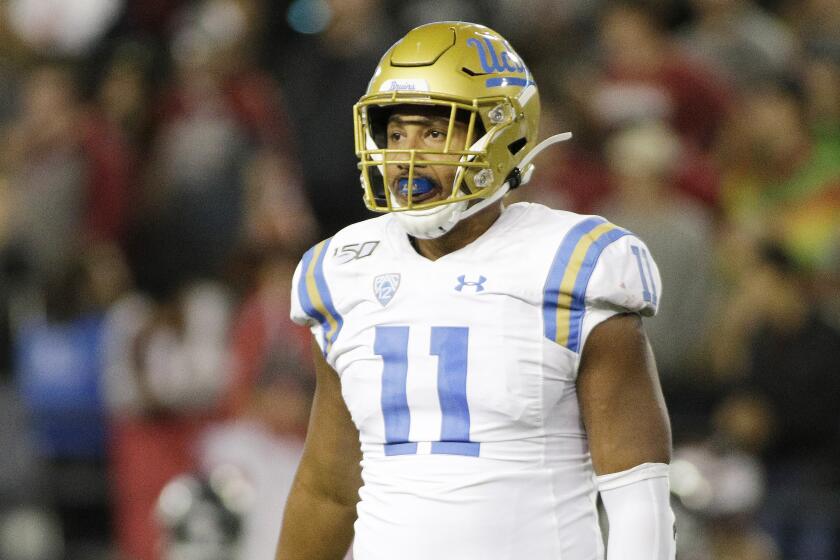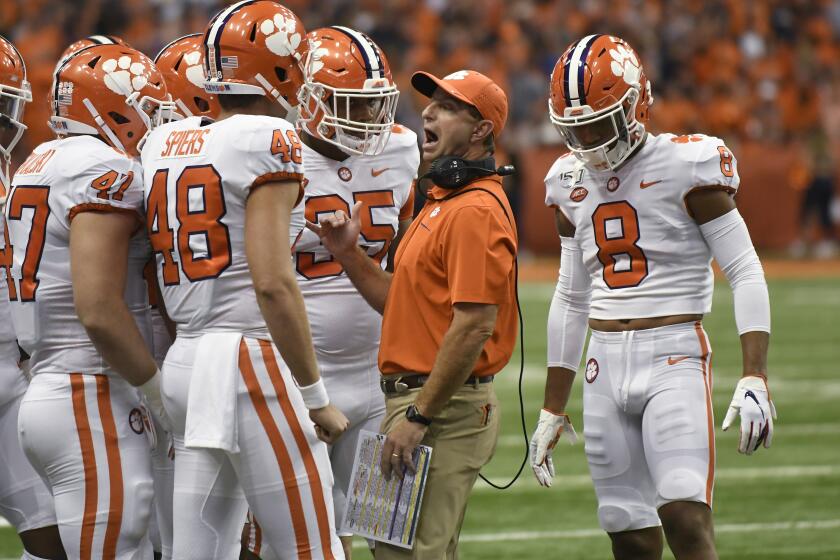Longtime NCAA reform advocate seeing promise and hope amid ‘fair pay to play’ push
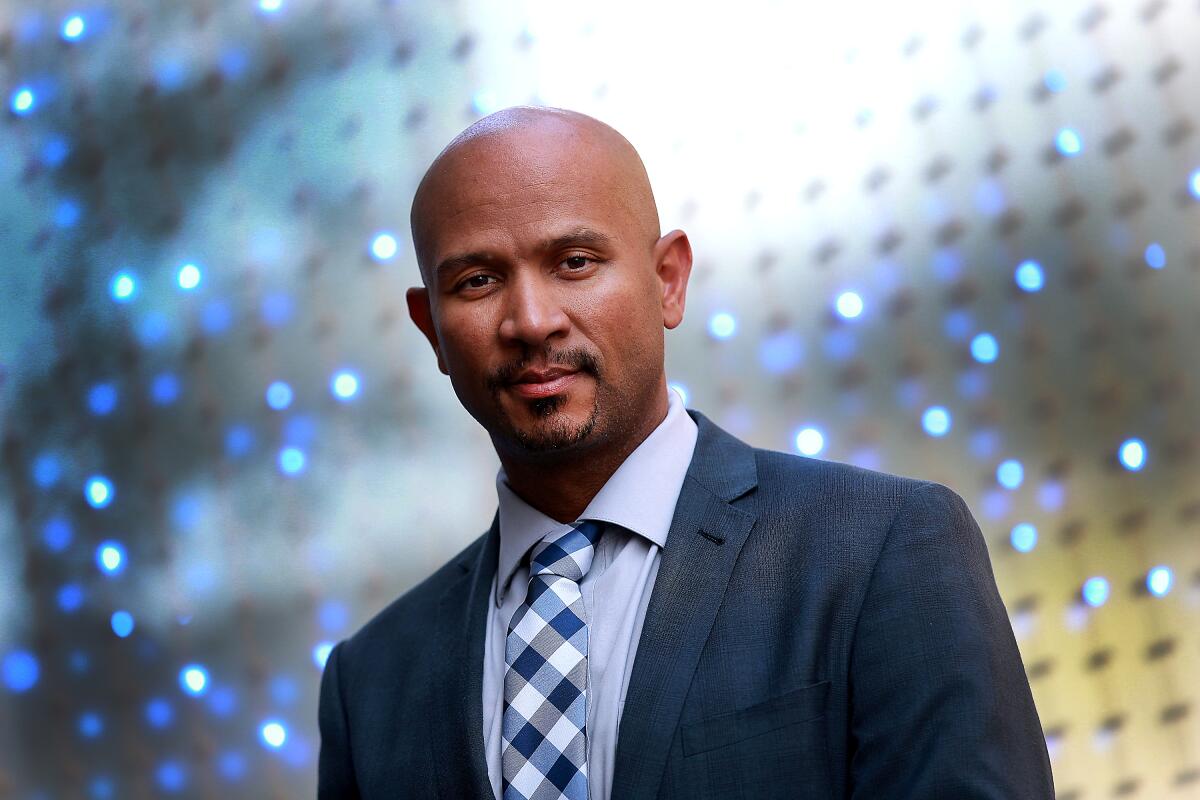
- Share via
Long before the regular appearances on cable news networks, speaking engagements at the Justice Department and co-sponsoring state legislation that would fundamentally change college sports, Ramogi Huma fumed over groceries.
They arrived at the apartment of UCLA football player Donnie Edwards in late 1995, allegedly dropped off by a sports agent. When the gesture was made public, the NCAA suspended the star linebacker for one game and made him donate $150 to charity to cover the cost of the groceries.
Huma, then a freshman linebacker for the Bruins, couldn’t believe a college athlete could be punished over food.
“The players didn’t have a voice,” he said. “The whole team was upset, but no one came and said, ‘We want to hear your concerns. How can we make this better?’”
The situation triggered Huma’s two-and-a-half decade journey to become one of the leading advocates of reforming the multi-billion dollar college sports industry. He is executive director of the nonprofit National College Players Assn., works from home in Eastvale, Calif., and, according to the organization’s most recent Internal Revenue Service filing, makes about $83,000 a year.
Keisean Lucier-South couldn’t stop himself from celebrating after delivering a huge hit that helped preserve UCLA’s comeback against Washington State.
“When he gets his mind set on something, he’s in it for the long haul,” said Daylon McCutcheon, the former USC and Cleveland Browns defensive back who has known Huma since age 9 and serves on the NCPA board. “He’s more passionate about it today than he was [at the start]. It seems like it gets even stronger each day.”
After years of campaigning against the National Collegiate Athletic Assn., the governing body for college sports, Huma, 42, is on the verge of his biggest victory. The California Legislature passed bill SB-206 earlier this month, which would allow college athletes to be paid for the use of their names, images and likenesses. The NCAA assailed the bill, authored by state Sen. Nancy Skinner (D-Berkeley), as “unconstitutional” and warned that it would “erase the critical distinction between college and professional athletes.”
Gov. Gavin Newsom hasn’t given a direct answer to whether he’ll sign the legislation but said he has “very strong opinions on the subject” as a former college athlete. He pitched for Santa Clara. Newsom has until Oct. 13 to make a decision. If he signs, it wouldn’t take effect until Jan. 1, 2023.
“I think this bill is a freight train,” Huma said. “Out of all the different avenues over all the years, I think this is the most promising.”
His reform efforts didn’t always look that way.
They started in 1997, when Huma and UCLA defensive back Ryan Roques founded a student group to advocate for athletes. Though a hip injury ended Huma’s playing career a year later, he remained in school to earn a master’s degree in public health. He realized the embryonic pro-athlete movement couldn’t survive without being attached to an existing organization.
Huma emailed several unions. Only the United Steelworkers responded, eventually agreeing to provide financial and logistical support.
“They took us on as their pet project,” Huma said.
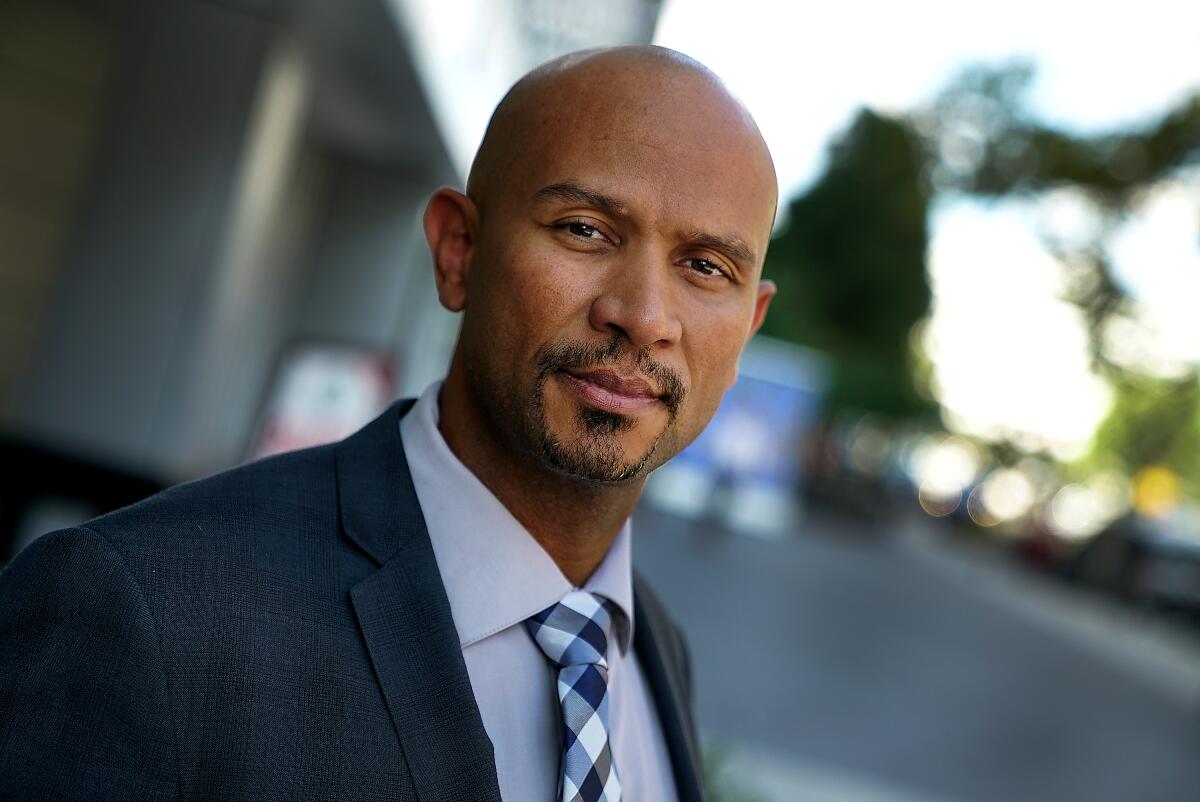
The group — christened the Collegiate Athletes Coalition — held its first news conference on Jan. 18, 2001, at UCLA. The pleas for improved healthcare and increased monthly stipends attracted a smattering of news coverage, but little changed.
“We’re not a here-today, gone-tomorrow group,” Huma told the Los Angeles Times in November 2002. “We plan on being a permanent fixture in college sports.”
The group handed out leaflets. Met with players at other schools. Supported lawsuits targeting the NCAA, including former UCLA basketball player Ed O’Bannon’s antitrust lawsuit over the use of athlete images in video games. Appeared on television programs such as “60 Minutes.” Lobbied state and federal lawmakers for health and safety improvements. Backed California legislation that became the Student-Athlete Bill of Rights in 2012, mandating improved medical coverage among other benefits. Supported college athletes wearing bracelets in 2013 to protest their treatment by the NCAA. Led efforts — ultimately scuttled by the National Labor Relations Board — to unionize Northwestern’s football team in 2014.
But California’s name, image and likeness legislation, originally known as the Fair Pay to Play Act, marked a new chapter in the reform efforts.
The scuffle over whether college athletes should profit from the use of their name, image and likeness actually began years before the grocery incident mobilized Huma. Walter Byers, the NCAA’s executive director from 1951 to 1987, proposed to the organization’s executive committee in 1985 that when athletes endorse products, the proceeds should go into trust funds they could access after graduation.
“I argued that since the colleges were exploiting their talent, the athletes deserved the same access to the free market as the coaches enjoyed,” Byers wrote in his 1997 memoir “Unsportsmanlike Conduct.”
The NCAA believes the Fair Pay for Play Act will hurt competitive balance between schools, but there’s little competitive balance in college football already.
The proposal went nowhere.
The current legislation, introduced in February, put Huma in the familiar position of lobbying lawmakers. He found receptive audiences in office after office in Sacramento.
“He convinces politicians to think about things in ways they’re not used to thinking about,” said Andy Schwarz, an economist and longtime advocate of college sports reform who has known Huma since 2003 and co-sponsored the legislation.
Huma’s pitch has evolved from the early days. He frames the legislation as about civil rights and free enterprise.
“I know that if we can get into the offices that we can change minds, even if they’re on the fence,” Huma said.
Big names have taken up the cause. LeBron James tweeted support for the bill to more than 43 million followers. So did Draymond Green. Russell Okung, the Chargers offensive lineman, testified in favor of the legislation in July.
In addition to the NCAA, the University of California, California State University, Stanford and USC opposed the bill.
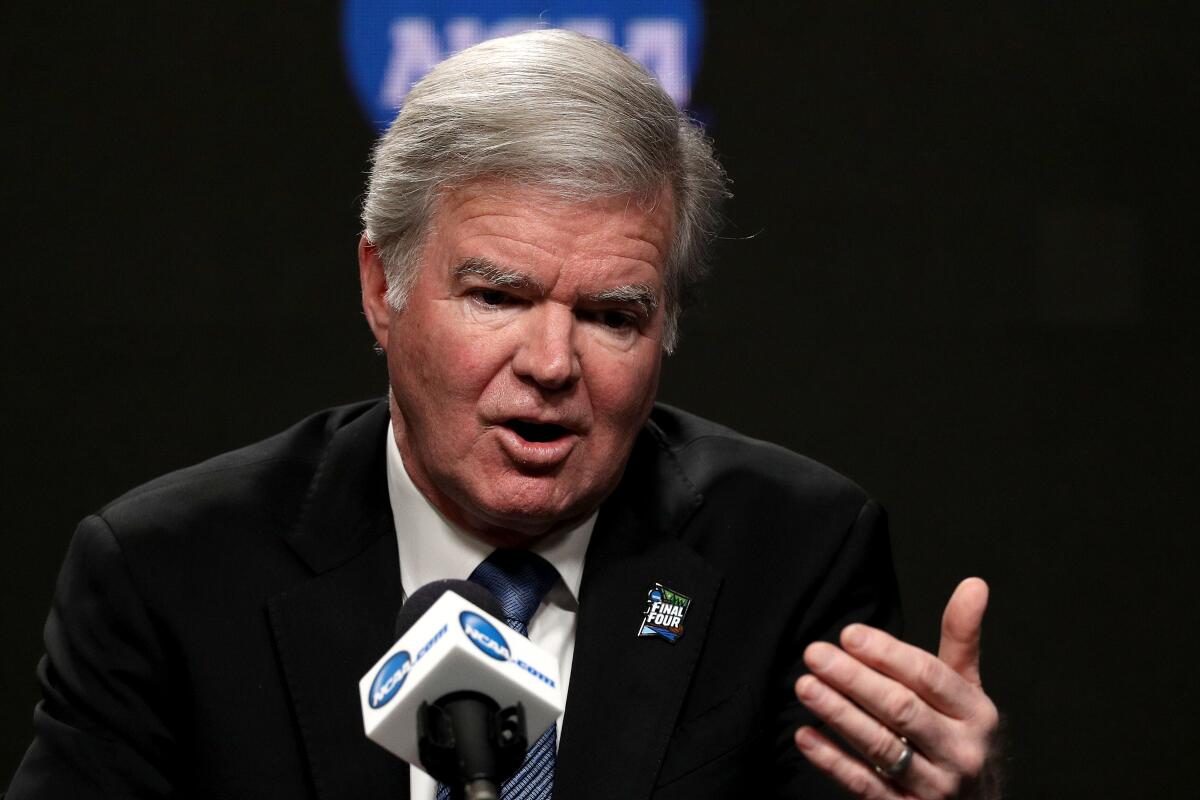
The key moment in Huma’s eyes came in June when NCAA president Mark Emmert implied in a letter to two state Assembly committees that California schools might be barred from the organization’s championships if the legislation became law.
“I thought politically it would be a tougher road,” Huma said. “I was encouraged to see it was the opposite: Lawmakers expressed they were offended and wouldn’t be bullied. That threat itself put the bill on the national stage.”
He added: “It was just a big help.”
Lawmakers have been receptive to Huma’s arguments. Before one committee vote in June, Assemblywoman Sydney Kamlager-Dove (D-Los Angeles) savaged the NCAA as “right out of ‘The Godfather.’ ” Similar rhetoric followed another letter from the NCAA in early September saying that the bill would keep California schools from the organization’s competitions.
The state Assembly approved the bill 73-0 earlier this month; the state Senate followed two days later with a 39-0 vote to send the legislation to Newsom.
The NCAA formed a group in May to study the name, image and likeness issue. It is expected to release a report in October. The 19-member committee includes conference commissioners, college presidents and athletic directors. Huma isn’t involved.
Huma is already working to thwart potential legal challenges to the legislation — that‘s why he spoke at the Justice Department on Monday — and supporting similar bills in other states.
“I stayed very optimistic because I always see new avenues,” Huma said of the last two decades. “If it’s not a lawsuit, it’s legislation. ... There’s always something that can be done.”
Times staff writer Melody Gutierrez contributed to this report.
More to Read
Go beyond the scoreboard
Get the latest on L.A.'s teams in the daily Sports Report newsletter.
You may occasionally receive promotional content from the Los Angeles Times.
